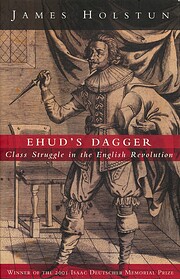

Auf ein Miniaturbild klicken, um zu Google Books zu gelangen.
|
Lädt ... Ehud's Dagger: Class Struggle in the English Revolutionvon James Holstun
 Keine Keine aktuelle Diskussion zu diesem Buch. keine Rezensionen | Rezension hinzufügen
Auszeichnungen
Seventeenth-century England saw the first capitalist revolution of the modern world – a struggle by working men and women to create a libertarian future and keep themselves from being dragged into the slough that many are still struggling to escape. In Ehud's Dagger, James Holstun reconstructs their radical projects and calls for a return to and development of marxist history from below. He begins with a powerful critique of those anti-communist historians and literary critics who have tried to ignore or deny the role of working people in shaping the English Revolution. Then, drawing on Ernst Bloch's utopian marxism, Jean-Paul Sartre's analysis of practical ensembles, and the political marxism of the British marxist historians, he begins his reconstruction of five seventeenth-century radical projects. In a Caroline prologue, he examines the political and poetic furor surrounding John Felton, who assassinated the Duke of Buckingham in 1628, enabling anonymous writers, readers and circulators of verse libels to contemplate a republican alternative to Charles's attempted absolutism. He then turns to the Revolution proper, focusing on the common soldiers of the Puritan New Model Army, who formed a military soviet in the summer of 1647 and bested their capitalist officers in debate; the Fifth Monarchist visionary Anna Trapnel, who wrote, preached, and prophesied publicly against the Protectorate on behalf of sectarian small producers; the Leveller theorist and desperado Edward Sexby, who wrote the brilliant republican treatise Killing Noe Murder and attempted to assassinate Oliver Cromwell; and the agrarian communist Diggers of Surrey, whose comrade and leader Gerrard Winstanley was the foremost social theorist of seventeenth-century England. Richly detailed and rigorously argued, Ehud's Dagger will spark renewed historical and literary critical interest in the prophetic writing, political struggle, and creative practical consciousness of working people in the early modern world. Keine Bibliotheksbeschreibungen gefunden. |
Aktuelle DiskussionenKeine
 Google Books — Lädt ... Google Books — Lädt ...GenresMelvil Decimal System (DDC)820.9358Literature English English literature in more than one form History, description, critical appraisal of works in more than one form Literature dealing with specific themes and subjects Humanity Historical, political, military themesKlassifikation der Library of Congress [LCC] (USA)BewertungDurchschnitt: (3.67) (3.67)
Bist das du?Werde ein LibraryThing-Autor. |
||||||||||||||||||||||||||||||||||||||||||||||||||||||||||||||||||||||||||||||||||||||||||||||||||||||||||||||||||||||||
Presupposes an in-depth knowledge of the 17th century. Interesting, surprisingly lively. (